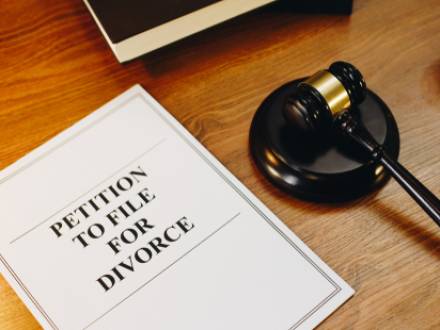Recent Blog Posts
I Am Afraid of How My Divorce Will Affect My Children. What Should I Do?
 If you are a parent going through a divorce in DuPage County, you are probably worried about how this major change will affect your children. Many parents try everything possible to keep their marriage together, but sometimes divorce is the right decision for everyone involved.
If you are a parent going through a divorce in DuPage County, you are probably worried about how this major change will affect your children. Many parents try everything possible to keep their marriage together, but sometimes divorce is the right decision for everyone involved.
The good news is that children can and do live happy, healthy lives with divorced parents. In 2026, there are several steps you can take to help your children cope with this difficult transition. Our Naperville divorce attorneys can help you understand what these might look like in your situation.
What Should I Tell My Children About the Divorce?
One of the hardest conversations a parent can have is telling your children that they are getting a divorce. How you approach this discussion can make a big difference in how they process the information.
Is Alimony Automatic in Illinois Divorces?
 Alimony, called maintenance under Illinois law, is not automatic in an Illinois divorce. Whether maintenance is awarded depends on the facts of the marriage and the financial situation of each spouse. Courts look at need, ability to pay, and fairness, not assumptions.
Alimony, called maintenance under Illinois law, is not automatic in an Illinois divorce. Whether maintenance is awarded depends on the facts of the marriage and the financial situation of each spouse. Courts look at need, ability to pay, and fairness, not assumptions.
While divorce is relatively common, outcomes vary widely. If you have questions about the specifics of your case, contact our Naperville, IL spousal maintenance lawyers for a personalized evaluation.
Is Alimony Required in Every Illinois Divorce?
Illinois courts do not automatically award maintenance in every divorce. Some divorces end with no ongoing financial support at all.
Judges first decide whether maintenance is appropriate. Only after that decision is made does the court examine how much support may be paid and for how long. Short marriages, similar incomes, or strong earning ability on both sides often result in no maintenance award. This case-by-case approach is meant to keep outcomes fair rather than one-size-fits-all.
What is the Illinois Divorce Process Like?
 The divorce process can be difficult and painful, even under the best circumstances. Having to navigate the complicated legal process, plus the emotional and financial challenges, can be hard to manage on your own.
The divorce process can be difficult and painful, even under the best circumstances. Having to navigate the complicated legal process, plus the emotional and financial challenges, can be hard to manage on your own.
While no two divorce proceedings are alike, most follow the same general format. Our Naperville divorce attorneys can explain the basics of the divorce process.
How Do I Start The Divorce Process?
All divorces start with something called a petition. However, before you can finalize your divorce, you have to make sure you have lived in Illinois for 90 days or more.
Under the Illinois Marriage and Dissolution of Marriage Act, specifically 750 ILCS 5/401, Illinois is what is known as a no-fault divorce state. This law changed how divorce works in Illinois and made the process more straightforward.
How Can I Have an Uncontested Divorce in Illinois?
 While it might seem like something to take for granted, the fact that all people are different matters a lot for divorce. The CDC estimates that around 650,000 divorces happen every year. Every one of those couples, families, and divorces has its own unique dynamic. Even though divorce on TV often looks like spouses doing everything in their power to hurt each other, many simply do not fit that description.
While it might seem like something to take for granted, the fact that all people are different matters a lot for divorce. The CDC estimates that around 650,000 divorces happen every year. Every one of those couples, families, and divorces has its own unique dynamic. Even though divorce on TV often looks like spouses doing everything in their power to hurt each other, many simply do not fit that description.
There are even couples who decide to end their marriage but want to work together to ensure they can each enjoy their future, especially if they have children. Other couples just want to avoid a long, expensive fight in court. Couples who want this can sometimes get what is called an uncontested divorce.
An uncontested divorce is when spouses agree on all terms of their divorce settlement. If you are interested in an uncontested Illinois divorce in 2026, there are certain requirements we will discuss in this blog.
Will I Go to Jail For Not Paying Child Support?
 After a divorce with children, you may be ordered to pay child support depending on the custody arrangement. Child support payments typically last until the child graduates from high school or becomes an adult. As you might expect, these payments can put a strain on your finances. But unless there is a significant good-faith change to your circumstances, like an unexpected layoff, you will still be responsible for making those payments.
After a divorce with children, you may be ordered to pay child support depending on the custody arrangement. Child support payments typically last until the child graduates from high school or becomes an adult. As you might expect, these payments can put a strain on your finances. But unless there is a significant good-faith change to your circumstances, like an unexpected layoff, you will still be responsible for making those payments.
Failure to pay child support can come with serious penalties, including criminal prosecution. An Illinois family law attorney at Pesce Law Group, P.C. can help you appeal for modification of the court order. The longer you avoid paying child support, the harsher the penalties, so taking swift action is important.
Child Support Nonpayment, Income Garnishment, and Employment
In Illinois, one of the first steps the state might take if you fall behind on child support payments is wage garnishment. Your employer automatically withholds a portion of your paycheck and sends it directly to your child’s other parent or the Illinois Department of Healthcare and Family Services (HFS). This can have serious consequences, including:
Can We Get Divorced Without Going to Court?
 If you and your spouse want to get divorced but avoid a long, ugly courtroom battle, you have options. Illinois law allows for several ways to get divorced outside of traditional court litigation.
If you and your spouse want to get divorced but avoid a long, ugly courtroom battle, you have options. Illinois law allows for several ways to get divorced outside of traditional court litigation.
At Pesce Law Group, P.C., our DuPage County divorce attorneys are experienced in mediation and other divorce strategies. If your goal is to stay out of court, we can help.
What Is an Uncontested Divorce?
An uncontested divorce means both spouses agree on all major issues including property division, spousal maintenance, and, if you have children, custody and support arrangements. You work together to create a marital settlement agreement that addresses everything.
Illinois law under 750 ILCS 5/401 allows uncontested divorces when you both agree the marriage has irretrievably broken down. Many counties in Illinois, including DuPage County, allow certain uncontested divorces to be finalized without either party appearing in-person before a judge. Your attorneys submit all paperwork, and the judge reviews and approves it. You may have to attend a remote prove-up session.
Can I Claim the Child Tax Credit After My Divorce?
 Tax season after divorce brings new questions and complications. One of the biggest concerns for divorced parents is who gets to claim the Child Tax Credit. This credit can be worth thousands of dollars and could make a significant difference in your tax refund.
Tax season after divorce brings new questions and complications. One of the biggest concerns for divorced parents is who gets to claim the Child Tax Credit. This credit can be worth thousands of dollars and could make a significant difference in your tax refund.
After a divorce, both parents often want to claim it. But federal tax law only allows one parent to claim the credit for each child each year. So – do you get to claim it, or does your spouse? Meet with our Naperville, IL divorce lawyer for help with this and other tricky divorce questions.
Who Gets to Claim the Child Tax Credit Under Federal Law?
The IRS has clear rules about who can claim the Child Tax Credit. The custodial parent is the parent with whom the child lives for the greater number of nights during the tax year. That parent has the right to claim the credit unless they release it to the other parent.
Five Tips for Preparing for Divorce
 If you are thinking about divorce, you are probably feeling anxious and unsure about what comes next. That is completely normal. Divorce affects your finances, living situation, and even your daily routine. The good news is that you can take steps now to make the process smoother and less overwhelming.
If you are thinking about divorce, you are probably feeling anxious and unsure about what comes next. That is completely normal. Divorce affects your finances, living situation, and even your daily routine. The good news is that you can take steps now to make the process smoother and less overwhelming.
At Pesce Law Group, P.C., our Naperville divorce attorneys have nearly two decades of experience helping clients prepare for major life changes. These practical steps can help you protect yourself and move forward with confidence when you file for divorce in 2025.
Get Financially Organized
Before filing for divorce, take time to really understand your finances. Go through your bank accounts, mortgages, retirement plans, insurance policies, tax returns, and credit card statements. Create a list of all assets and debts in both your name and your spouse’s name.
Should I Talk to a Divorce Attorney?
 Many people worry that meeting with a divorce lawyer will make divorce inevitable, but this is not true. Speaking with an attorney does not mean you must file for divorce. It simply means you are finding out about your rights and options.
Many people worry that meeting with a divorce lawyer will make divorce inevitable, but this is not true. Speaking with an attorney does not mean you must file for divorce. It simply means you are finding out about your rights and options.
If you are feeling unsure, confused, or stuck, a meeting with a Naperville, IL divorce lawyer can help you understand what divorce would look like for your specific situation. At Pesce Law Group, P.C., we offer no-pressure consultations so you can get the information you need before you decide what to do next.
When It’s Time to Talk to a Divorce Lawyer
You do not need to wait until you are ready to file paperwork to contact a lawyer. In fact, most attorneys encourage clients to reach out earlier rather than later. Here are some situations where meeting with a divorce lawyer is usually a good idea.
How to Prepare for Your Interview with a Child Custody Evaluator
 When parents cannot agree on custody or parenting time, the court may appoint a child custody evaluator. This person’s job is to objectively look at the situation and recommend an arrangement that is best for the children. These evaluations are common in high-conflict custody disputes, especially when both parents believe they should have sole custody.
When parents cannot agree on custody or parenting time, the court may appoint a child custody evaluator. This person’s job is to objectively look at the situation and recommend an arrangement that is best for the children. These evaluations are common in high-conflict custody disputes, especially when both parents believe they should have sole custody.
If a judge has ordered a custody evaluation for your case, you need to know what evaluators look for and how to present yourself in a calm, credible way. Your behavior and attitude during the evaluation can have a major impact on the outcome of your case. Our DuPage County custody lawyers can help.
What Does a Child Custody Evaluator Do?
Under Illinois law (750 ILCS 5/604.10), courts may order a professional custody evaluation. The evaluator is usually a licensed psychologist, social worker, or therapist.











 630-352-2240
630-352-2240



